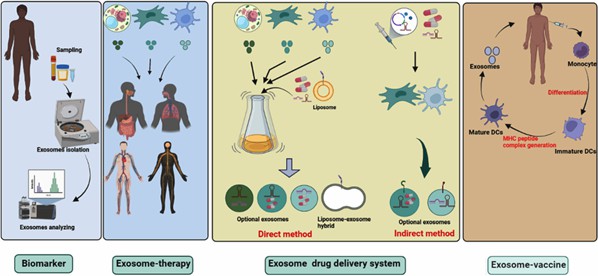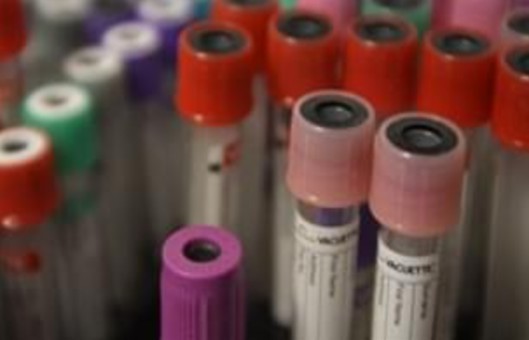Application of Exosomes in Clinical Trials
Cell Communication and Signaling. 2022 Sep 19; 20 (1): 145.
Authors: Rezaie J, Feghhi M, Etemadi T.
INTRODUCTION
- Exosomes are progressively known as significant mediators of cell-to-cell communication. They convey active biomolecules to target cells and have vital functions in several physiological and pathological processes, and show substantial promise as novel treatment strategies for diseases. Mesenchymal stem cells (MSCs) and dendritic cells (DCs) are two widely held cell sources for exosome use. MSCs-derived exosomes are commonly used for inflammation treatment and drug delivery, while DCs-exosomes are used to induce inflammation response in cancer patients.
- The main clinical application of exosomes is using them as a biomarker, cell-free therapeutic agents, drug delivery carriers, basic analysis for exosome kinetics, and cancer vaccine. Different exosomes from human or plant sources are utilized in various clinical trials.
 Fig. 1 Clinical application of exosomes. (Rezaie J, et al., 2022)
Fig. 1 Clinical application of exosomes. (Rezaie J, et al., 2022)
Biomarker Application
- Exosomes are present in many biofluids, possibly providing a new window into monitoring the status of cells in normal physiology or upon onset of pathological conditions.
- By a simple liquid biopsy of plasma, serum, urine, saliva, etc. exosomes and other EVs are available for profiling their cargo for diagnosis, prognosis, progress, and chemoresistance biomarker applications.
- Exosomes are stable in most body fluids and shield biomolecules from degradation. Under pathological conditions, cellular changes can be reflected in the biological component of exosomes released by cells.
Drug-Delivery Application
- Exosomes may be a good applicant for the clinical translation of several drug-delivery platform formulations. From a drug delivery standpoint, exosomes are analogous to liposomes, regarding phospholipid structure.
- However, exosomes can be collected from various body fluids and cells with a complex structure of different lipids and surface proteins and receptors; these biomolecules may help tissue and cell targeting, whereas some warrant minimal non-targeting interactions. These distinctive protein-decorated phospholipid membranes may likely have the definite barcodes desirable to interact with their target both neighboring and at distant locations.
Exosomes Therapy
- There is increasing interest in using cell derivatives such as exosomes rather than stem cells for therapies. Currently, known exosomes from many native stem cells have been shown to recover adversarial conditions and damaged tissues.
- Some laboratories used strategies to increase exosomes production and improve the therapeutic potential of exosomes, including preconditioning of stem cells, genetically modification of stem cells, and conjunction of exosomes with biomaterials.
- Use of exosomes in clinical trials necessity to conform to GMP. Five categories of cells such as bone marrow-derived MSCs, human cardiac progenitor cells, monocyte-derived DCs, adipose tissue-derived stem cells, and HEK293 cells have been used in GMP for the production of exosome.
Exosomes-Based Vaccine
- Exosomes from tumor cells have been used for therapeutics to prompt strong anti-tumor immune responses. Furthermore, exosome-based vaccines showed hopeful outcomes against several kinds of infectious diseases.
- Exosomes from innate immune cells and tumor cells have the potential to be used as a vaccine for cancer. Several active molecules on exosomes like MHC and costimulatory molecules facilitate anti-tumor responses of immune cells.
RELATED PRODUCTS & SERVICES
Reference
- Rezaie J, et al. (2022). "A review on exosomes application in clinical trials: perspective, questions, and challenges." Cell Commun Signal. 20 (1), 145.


